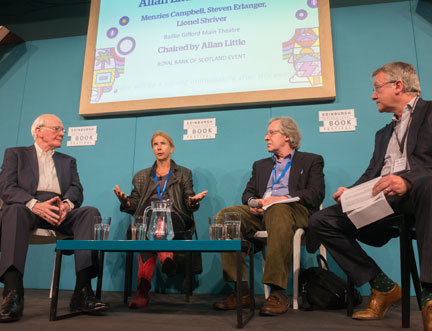More articles Friday 19 August 2016 1:45pm
Big Ideas Stirred by Little Debate

Can you fit the state of the States, the future of China, the tumult in the Middle East, Scotland’s status and the backdrop to Brexit into one hour – and one tent? Alan Little’s Big Debate gave it a good go, taking its audience on a whirlwind tour of current affairs and sparking incendiary opinions along the way. The former BBC special correspondent was joined onstage by the Liberal Democrat grandee Menzies Campbell, the New York Times London bureau chief Steven Erlanger and the novelist and commentator Lionel Shriver. Was the era of US and Western European influence in permanent decline, Little asked his guests - and the project of expanding liberal democratic values now an anachronism?
Shriver argued that in her native and adopted homes of the US and UK, “democracy is alive and well - but people are not completely comfortable with democracy in reality.” The frequent use of the word “populism” as a pejorative, she said, indicated that “we’re a little queasy about democracy in action.” But she urged a reversal of the common despair over the rise of Donald Trump, arguing that his very anomalousness is cause for some celebration. “Maybe we have to do a little glass half-full here. Trump is a rarity. And he’s not going to win.”
The Republican candidate, said Campbell, has “articulated the fears and apprehensions of a whole class of Americans. If there’s no hope, no opportunity – it’s inevitable you’ll look for somebody who uses language like ‘we need to control our borders’, ‘we need to make America great again’.” Erlanger shared the opinion that current challenges to political norms were the consequence of “a huge increase in inequality. Economic growth has slowed to a crawl – and there’s a worldwide sense of trepidation about the future. We no longer expect things to keep getting better.”
With regard to Brexit, Campbell made the point that many votes to leave the EU were sourced in irrelevant or petty grumbles rather than thought-through oppositions, offering the example of a Fife voter who “voted to leave because Fife District Council has not been dealing properly with the floral tributes in the main square”. But Shriver was indignant about the perception that the vote was “the decision of people who were ignorant, poorly educated, self-destructive and racist”. Much talk had been heard, she said, of the racism unleashed by the vote; less about the “condescension and classism” heard from the other side.
Erlanger surmised that delays to the triggering of Article 50 were the source of some relief among other European leaders. “What do Merkel and Hollande really think about it? How many concessions could they actually give? If Article 50 came into play, then they’d have to show their hand.”
He diagnosed in the First Minister for Scotland a similar willingness to delay. “She really doesn’t want a second referendum yet, because to lose a second one would be awful.” The panel conveyed a broad scepticism about Scottish independence, emphasising that its economic case did not stand up without high taxation. “If all those people are willing to vote for high taxation – fine,” said Erlanger. “But you cannot sell it on the basis that you can have it all without high taxation.”
If those opinions stirred some dissent in the room, there was a cheerier reception for Campbell’s musings on Team GB and his own time as a champion sprinter. His success, he said, was down to steak and chips the night before, and on the day a concoction of “two eggs, hot milk and – believe it or not – a shot of brandy.” Easier to swallow, arguably, than some of the eventualities discussed. “World orders get old,” said Erlanger, “like relationships. The post-Cold War order is cracking.” And liberal democracy? “We need to defend it before we start promoting it.”
- 2026 Festival:
- 15-30 August
Latest News
 Major new partnership with Celtic Connections
Major new partnership with Celtic Connections



